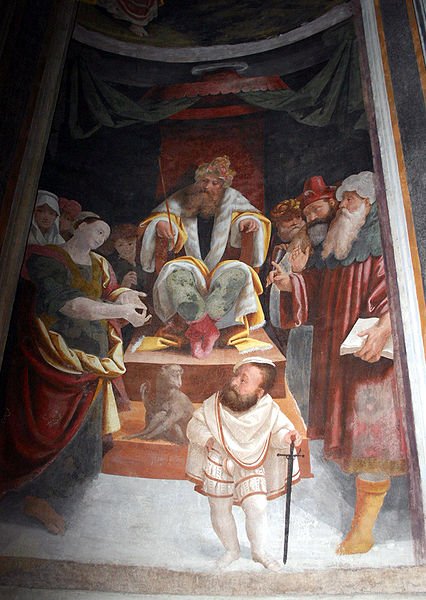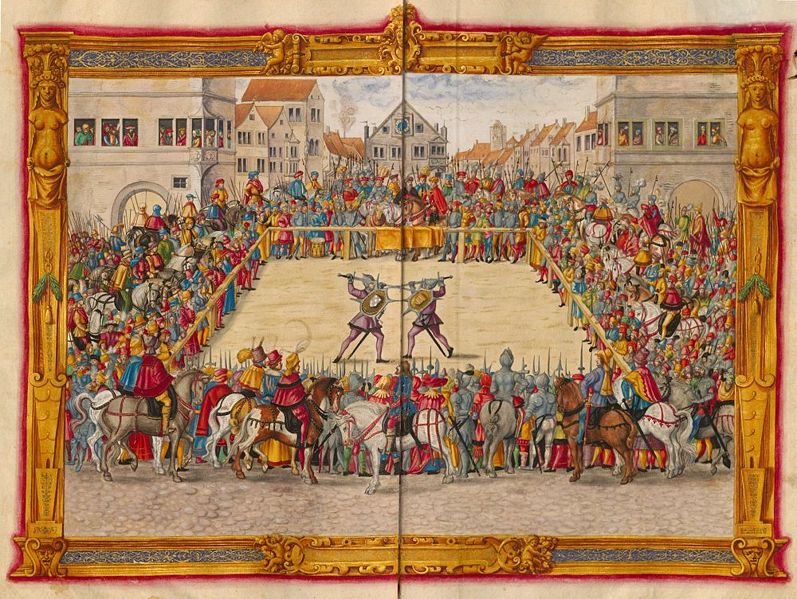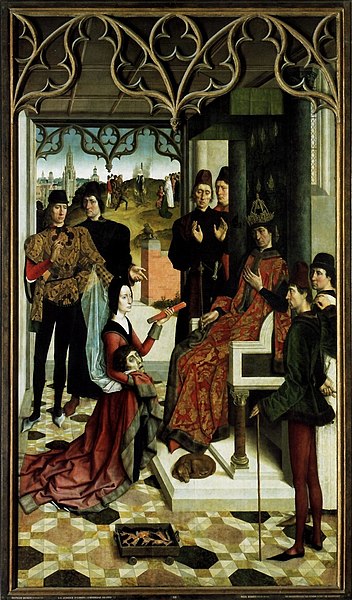Theocratic Courts

Theocratic Courts are a form of government in which one or more deities are recognized as supreme justice, giving divine guidance to human intermediaries who manage the day-to-day affairs of the law.
Crime and Punishment
Author Keith Baker
Series Campaign Style
Publisher Atlas Games
Publish date 2003
At the GM’s discretion, a justice who intentionally violates the precepts of his god may be stripped of the ability to cast divine spells, or he may suffer the effects of one of the curses described in Chapter Eight. The punishment will remain in effect until the justice has performed an act of Atonement, either through the spell or as dictated by his faith.
Of course, the actions that will call for divine punishment will vary considerably based on the nature of the god. A goddess of Evil and Trickery may actually encourage her justices to take bribes, while a god of Law and Good would be sure to punish such an act. A god of Death and Destruction might punish his justice for taking mercy on someone who should by rights be sent to the gallows.
If you are allowed to speak, you may make a Diplomacy (or Charisma) check to try to influence the justice, as described in Law in Secular Society. If you have at least five ranks in Knowledge (religion), you get a +2 synergy bonus to your roll. Social standing is less important in the theocratic court than in secular society, but the GM may choose to apply any of the following bonuses or penalties to your roll.
| Status | Diplomacy Check Modifier |
| Follower of a condemned religion | -10 |
| Convicted heretic | -8 |
| Follower of a foreign religion | -2 |
| Stranger to the region | -2 |
| From a hostile nation | -2 |
| Distrusted race | -2 |
| Distrusted class | -1 |
| Follower of the national religion | +2 |
| Priest of the national religion | +4 |
| Respected religious leader | +8 |
The religious penalties do not stack – you’re only considered a heretic if you follow the same religion as the justice. In addition, if you are a heretic, you do not receive any of the usual bonuses for sharing the same religion as the judge. The religious bonuses do not stack, either; if you are a priest of the national religion, it is already assumed that you are a follower of it.
During testimony, the justice will use Sense Motive to gauge the truth of the statements. He, or an attending truthreader, will likely use one or more of the following spells: detect thoughts, discern lies, light of truth, painful truth, read the guilty face, or zone of truth. At the GM’s discretion, a judge who finds that you honestly believe that you are innocent may have his attitude improved by one category prior to your Diplomacy check. Of course, if you’re found to be lying, this will almost certainly cause the judge’s attitude to shift to hostile or unfriendly.
In this style of court, defendants are rarely allowed to use advocates; the justice will wish to judge the truth of your words, and an advocate could evade the effects of truth-telling spells by simply being unaware of the facts of the case – as far as your advocate is concerned, she isn’t lying if she says you’re innocent.
At the end of these statements, you may make an opposed Diplomacy (or Charisma) check to influence the attitude of the justice, with the same modifiers given in “The Voice of God.” Of course, the judge’s attitude may not matter, if divine law is clear on how your case should be resolved.
The GM will decide if you are offered this opportunity. If so, you must first make up a myth that you feel supports your actions. You don’t have to go into detail, and you don’t have to worry about matching your story to historical names – but you need a simple fable, moral, or myth that you feel justifies your actions (whether you are innocent or guilty) and fits within the basic precepts of the religion. Once you’ve done this, you and your accuser must make opposed Knowledge (religion) checks; the GM will modify your roll based on the strength and plausibility of your myth. This acts just like a Diplomacy (or Charisma) check, and is used to influence the attitude of the justice.
You can have an advocate stand in for you to make the rolls – but you still need to come up with the story.
Once the justice has heard these pleas, she will reflect on the matter. Ultimately, she must choose a religious text that applies to the situation and provides a punishment or a reason to release the defendant. The judge has a limited set of options; unlike the justice in ‘The Voice of God,’ her decisions can be questioned by the church,and she may lose her position if she makes questionable rulings, not to mention risk divine displeasure. Ultimately it’s up to the GM to decide what options the religion would present and how the judge can interpret the scripture. You cannot question the decisions of the justice – but if there is sufficient time before you suffer the consequences of judgment, a higher ranking member of the church could question the application of scripture – assuming, of course, she had some reason to intervene on your behalf.
Punishment
The level of punishment would depend on the nature of the crime. Here are a few possibilities, ranging from minor to severe. These can be considered the result of a scourge spell with a caster level of 26.
- Warts, boils, or discolored skin on the face. This results in a general -1 penalty to Charisma. However, people belonging to the local religion will recognize it as a sign of the divine punishment; this results in a -4 to any Charisma-based skill checks and a basic attitude of unfriendly when dealing with religious NPCs.
- A -2 penalty to any one ability score, representing weakness, general confusion, or a repellent aura.
- Nightmares give you a 50% chance each that you will suffer effects identical to the nightmare spell every time you try to sleep.
- Any sort of disease. Such an affliction would not be contagious, even if the disease normally is.
- A 50% chance that any spell you cast will backfire, having the reverse effect or striking you instead of your target.
- Loss of voice is a fitting punishment for a Con artist or someone who used magic to commit a crime.
- Loss of sight or hearing, as the blindness/deafness spell.
- Any of the effects of bestow curse.
- A repellent aura causes all creatures – both animals and sentient beings – to have a hostile attitude towards you. This also lowers your effective Charisma by 6 points.
- Any of the curse effects provided in Chapter Eight. See scourge and malediction for ideas.
Getting a divine punishment removed is no simple matter. You can have it removed using the standard techniques for breaking a scourge, but the high caster level makes this extremely difficult. However, a priest of the same religion as the god who laid the punishment upon you can absolve you of your guilt by setting a mundane form of punishment. Once you complete your sentence, the gods will be satisfied and the curse will be removed. However, the punishment does have to be appropriate to the crime; if you just happen to have a priest of Khesh in your party, she can’t let you off the hook every time Khesh gets mad at you.
In addition to these techniques, a cleric can use Atonement to intercede with the gods. But in the case of a major transgression a god may not be willing to interfere with the actions of another deity, especially if the afflicted individual is not a follower of the god providing the Atonement. This may result in an increased XP cost to the priest, or an outright failure of the ritual. And while Atonement, wish, or miracle can remove the scourge, if you have not truly atoned for your sin there is nothing to prevent the god from revisiting his anger upon you the next time you enter his earthly domain.
Trial By Ordeal
Theocratic courts will often turn to trial by ordeal. The concept of the ordeal is that the fate of the accused is placed in the hands of the gods themselves – either literally, as in the case of a combat to the death, or figuratively, if the accused is asked to perform a miracle. The idea is that the gods will protect the innocent from harm, and ensure that the guilty are punished.
In some societies – especially chaotic ones – trial by ordeal could be the only form of law. A chaotic evil nation dedicated to a god of War and Strength could easily make trial by combat the basis for any sort of dispute. In lawful societies, it’s more likely to be a supplemental form of trial. Under the voice of god system, a justice could choose to set an ordeal instead of making a ruling himself. Under a system of divine interpretation, the scriptures could insist on ordeals for specific types of crimes.
Trial By Combat

Trial by combat is one of the most common forms of ordeal. While it’s especially appropriate for gods of War or Strength, many domains can fit within this form of trial. With Luck or Protection, will the god shield you from your enemy or grant you the luck you need? With Death or Destruction, can you prove yourself to be the vessel of the god’s power? The principle is that if the deity is on your side, you can’t possibly lose.
At the GM’s discretion, you may gain a sacred (or profane) bonus of +1 to +5 to AC, saves, and attack and damage rolls. On the other hand, if the god is not on your side, your opponent could receive this bonus.
The GM always has the final say in this matter; more often than not, the gods will leave the matter to your skill, wits, and the luck of your dice.
Trial by Element
Assuming that you’re dealing with still water and just have to keep afloat, this only requires a Swim check with a DC of 5. If your modified Swim score (combining Strength modifier, encumbrance or armor penalties, and ranks in the skill) is at least +4, you shouldn’t have to make regular per-round rolls. However, for every hour you need to stay afloat you must make a Swim check (DC 20) or suffer 1d6 points of nonlethal damage and become fatigued. In addition, if you’re afloat in salt water or otherwise tainted liquid, after a day has passed you will begin to suffer from dehydration. This requires you to make a Constitution check (DC 10, +1 for each previous check) once per hour, suffering 1d6 nonlethal damage for each failed check.

This requires you to make a Fortitude save (DC 15, +1 for each previous check) every 10 minutes; failure results in 1d4 points of nonlethal damage. If you become unconscious, you suffer 1d4 points of normal damage every 10 minutes, with no saving throw.
These are just a few examples. As with trial by combat, the GM may decide to give you a sacred bonus to checks or saves if the gods truly are on your side.
Trial by Skill
Using opposed Diplomacy checks, can you convince the jury of your innocence? In many ways, this is not unlike a traditional modern trial.
A god of Trickery or Luck could use a game like poker; a goddess of Knowledge would be more likely to use Chess, or a similar game of strategy and skill.
Tug-of-war could be resolved as an extended grapple. Holding weights could require a Strength check (DC 10, +1 per previous check) every minute, with the first to drop the weights being the loser.

 Buy me a coffee
Buy me a coffee